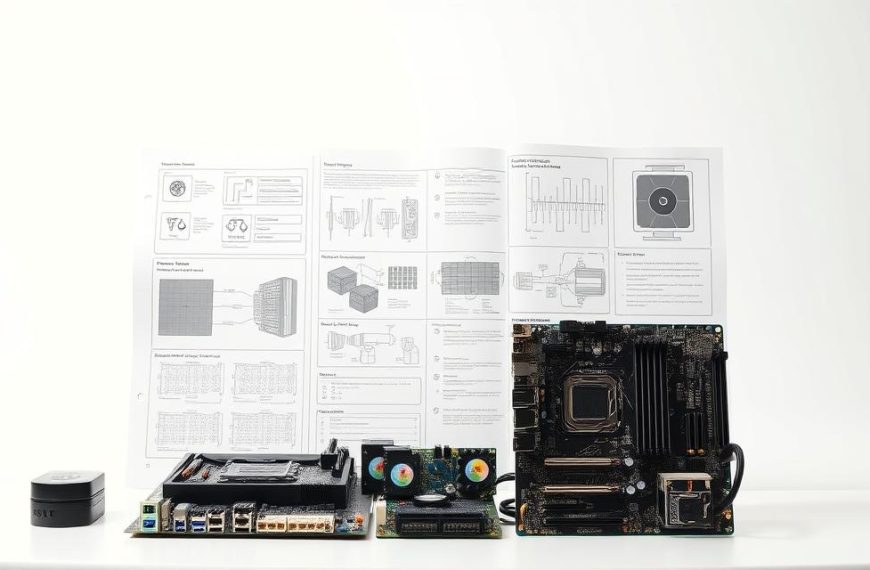Artificial intelligence is transforming modern enterprises by streamlining operations and boosting productivity. A 2023 Salesforce study reveals that 47% of businesses now leverage generative AI to enhance workflows. This shift highlights the growing role of automation in process management.
From predictive analytics to robotic task automation, intelligent systems minimize errors and accelerate decision-making. The global AI market, valued at $196.63 billion, thrives on rapid data interpretation capabilities. Tools like Camunda’s AI Form generator demonstrate tangible efficiency gains.
Leading corporations, including Microsoft and Shell, already integrate these solutions. Their success stories prove that combining AI with machine learning creates end-to-end improvements. The result? Faster operations, reduced costs, and competitive advantages.
This article explores practical applications across industries. Discover how cutting-edge technology reshapes traditional workflows for superior outcomes.
The Growing Role of AI in Modern Business
Modern companies increasingly rely on intelligent systems for competitive gains. A 2023 McKinsey report shows 35% of enterprises use artificial intelligence daily. This shift reflects broader trends toward automation and data-driven workflows.
Manufacturing leads the charge with collaborative robots (cobots). Priced at $24,000, these machines integrate machine vision for safety. Small and mid-sized firms now compete with giants like Toyota, thanks to scalable technology.
Content creation also transforms. Alibaba’s AI-CopyWriter produces 20,000 lines of copy per second. Forbes uses similar tools to personalize marketing campaigns, boosting engagement by 40%.
| Process | Traditional Method | AI-Enhanced Approach |
|---|---|---|
| Recruitment | Manual resume screening | Pymetrics’ bias-free AI analysis |
| Customer Service | Human-only call centers | Transcosmos’ 2x QA accuracy |
| Retail | Generic promotions | Marks & Spencer’s chatbot personalization |
Voice assistants like Google Duplex streamline scheduling. Unilever’s AI recruitment platform saves 70,000 person-hours yearly. These examples prove that intelligent systems redefine efficiency.
As adoption grows, businesses must balance innovation with ethical governance. The future belongs to those who integrate technology seamlessly into their processes.
How Can AI Be Used to Optimize Business Processes
Organizations worldwide harness advanced systems to refine workflows and elevate performance. These solutions tackle everything from mundane tasks to complex data analysis, delivering measurable results.
Streamlining High-Volume Operations
Repetitive activities consume valuable time. Intelligent automation handles them effortlessly:
- Camunda’s OpenAI Connector processes 3,000+ customer emails daily, cutting response times by 80%
- IDP solutions extract data from invoices with 99.2% accuracy, eliminating manual entry
- Shell’s predictive maintenance identifies equipment issues 72 hours before failure
“Automation isn’t about replacing humans—it’s about amplifying their capabilities.”
Data-Driven Decision Enhancement
Advanced analytics transform raw information into actionable insights:
| Function | Impact | Example |
|---|---|---|
| Risk Assessment | 35% faster loan approvals | JPMorgan Chase’s COiN platform |
| Inventory Management | 28% reduction in overstock | Walmart’s demand forecasting |
| Dynamic Pricing | 17% revenue increase | Uber’s surge algorithms |
Elevating Customer Interactions
Intelligent systems personalize engagement at scale:
Marks & Spencer’s chatbot recovers $2.3M monthly in abandoned carts. NLP routes inquiries to specialists 40% faster than manual methods.
Voicea’s EVA assistant reduces meeting follow-ups by 65%, freeing teams for strategic work. These innovations prove that intelligent process optimization creates tangible value.
Key Applications of AI in Business Process Optimization
Cutting-edge technology now drives significant improvements across critical business functions. Enterprises deploy intelligent systems to enhance accuracy, speed, and scalability. These innovations span fraud detection, talent management, and dynamic marketing strategies.
Fraud Detection and Risk Management
Financial institutions rely on pattern recognition to identify anomalies. AI analyzes transaction histories, flagging duplicates or suspicious activity with 99.8% accuracy. JPMorgan’s COiN platform reduces fraud investigation time by 35%.
Shell’s vision cameras detect fuel pump hazards in real time. Predictive analytics reroute shipments during natural disasters, minimizing supply chain disruptions. These tools transform risk mitigation into a proactive process.
Human Resources and Recruitment
RPG Group’s HR chatbot resolves 92% of employee queries within minutes. Leena AI slashes ticket resolution from 24 hours to just 4. Automation handles repetitive tasks like resume screening, ensuring bias-free shortlists.
- Pymetrics’ AI assesses candidates’ cognitive traits, reducing hiring bias
- Automated onboarding workflows cut administrative costs by 40%
Content Generation and Marketing
Natural language tools like Alibaba’s AI-CopyWriter produce 20,000 lines of SEO-optimized text per second. Salesforce Einstein predicts customer churn, enabling targeted retention campaigns. Dynamic content personalization boosts engagement rates by 30%.
“Generative design software accelerates product development cycles by 50%, merging creativity with efficiency.”
Computer vision ensures quality control in manufacturing, while AI-driven compliance workflows redact sensitive data automatically. These applications prove that process optimization thrives at the intersection of innovation and execution.
AI Technologies Powering Business Process Optimization
Three distinct AI technologies are reshaping how organizations approach process improvement. These specialized tools address different operational needs while delivering measurable efficiency gains. From creative tasks to predictive analytics, intelligent systems transform raw data into strategic advantages.
Generative AI for Creative and Operational Tasks
Modern enterprises use generative systems to accelerate content production and documentation. GPT-4 creates marketing copy in seconds—a task that traditionally took hours. Legal teams benefit from automated contract drafting that reduces review time by 70%.
Camunda’s natural language processing converts verbal instructions into process models 10x faster than manual mapping. This technology eliminates workflow design bottlenecks while maintaining accuracy. The results speak for themselves:
| Task | Traditional Method | Generative AI |
|---|---|---|
| Content Creation | 4 hours per article | 12 minutes |
| Process Modeling | 3-day workshop | 4-hour session |
| Contract Drafting | Manual templates | Automated clauses |
Predictive AI for Trend Analysis and Forecasting
Advanced algorithms analyze historical patterns to forecast future outcomes with remarkable precision. Camunda Optimize predicts SLA compliance using five years of operational data. Retailers leverage these insights to maintain optimal inventory levels, reducing overstock by 28%.
Predictive maintenance models identify equipment issues before failures occur. A mining company achieved 30% less downtime using vibration analysis and thermal imaging. These systems process complex information faster than human teams ever could.
Assistive AI for Workflow Guidance and Support
Intelligent assistants now guide employees through complex workflows. Camunda’s modeling recommendations reduce design errors by 45%. Medical diagnostic tools powered by neural networks achieve 97% accuracy in identifying abnormalities.
These systems excel at:
- Providing real-time process suggestions
- Automating quality control checks
- Generating performance improvement reports
“Assistive AI doesn’t replace human judgment—it enhances decision-making with data-driven insights.”
Together, these technologies create a powerful ecosystem for process automation. They deliver measurable improvements in speed, accuracy, and operational performance across industries.
Real-World Examples of AI Optimizing Business Processes
Leading corporations demonstrate tangible results by integrating intelligent solutions into daily operations. These implementations solve critical challenges while delivering measurable ROI. Three standout cases reveal the versatility of applied automation across industries.
Microsoft’s Automated Network Management
The tech giant’s AI systems resolve 83% of network issues without human intervention. Automated security patches deploy 60% faster than manual updates, significantly reducing vulnerability windows.
Key improvements include:
- Real-time anomaly detection in server farms
- Predictive bandwidth allocation during peak loads
- Automated ticket routing based on knowledge base analysis
Machine learning models analyze historical outage data to prevent recurrences. This proactive approach saves $4.2 million annually in downtime costs.
Shell’s Intelligent Procurement and Safety
The energy company achieved 18% drilling cost reductions through AI-powered training simulations. Computer vision monitors 5,000+ worksites for safety compliance with 99.4% accuracy.
Procurement teams leverage predictive analytics for:
- Dynamic pricing models in volatile markets
- Equipment maintenance forecasting
- Supplier risk assessment algorithms
Thermal imaging systems detect pipeline corrosion 45 days before visible signs appear. This early intervention prevents catastrophic failures while optimizing maintenance budgets.
RPG Group’s HR Support Transformation
Their AI-powered tool handles 15,000+ monthly inquiries through seamless SAP SuccessFactors integration. Employees receive instant responses to 92% of common questions via natural language processing.
The chatbot delivers:
- 24/7 policy clarification
- Automated leave balance updates
- Personalized training recommendations
Resolution times dropped from 24 hours to 4 minutes, boosting satisfaction scores by 37%. This implementation proves that intelligent support drives both efficiency and workforce engagement.
These examples showcase the power of process optimization through targeted technology adoption. Each case combines specialized knowledge with scalable solutions to address unique business challenges.
Future Trends in AI and Business Process Optimization
The next wave of artificial intelligence innovation will redefine enterprise operations. Gartner predicts 80% of companies will adopt intelligent processes by 2026, signaling a paradigm shift in workflow management.
Quantum machine learning emerges as a game-changer for complex pattern recognition. This technology analyzes millions of variables simultaneously, enabling breakthroughs in logistics and R&D. The market for AI-powered BPM tools grows at a 45% CAGR, reflecting soaring demand.
Key developments shaping the future include:
- Edge AI applications enabling real-time manufacturing adjustments with 30% faster response times
- Self-optimizing workflows using reinforcement learning to adapt dynamically
- Multimodal systems combining text, voice, and visual inputs for comprehensive analysis
IBM’s recent implementation shows the potential. Their AI supply chain solutions achieved $160 million in savings while maintaining perfect order fulfillment. Similar optimization breakthroughs occur across sectors.
“No-code platforms like Pipefy democratize process automation, allowing teams to design intelligent workflows without coding expertise.”
Ethical considerations gain prominence as adoption accelerates. New certification standards ensure responsible AI deployment in automated systems. Companies like Deloitte already reduce report preparation from days to hours while maintaining compliance.
These trends reveal an exciting roadmap for intelligent operations. Enterprises embracing this evolution will gain decisive competitive advantages in the coming decade. For deeper insights, explore AI-driven business automation strategies shaping modern enterprises.
Conclusion
Forward-thinking enterprises now achieve unprecedented productivity through strategic automation. Implementing intelligent solutions delivers 40% efficiency gains, as seen with platforms like Camunda and Pipefy. These tools minimize errors while accelerating workflow execution.
Human oversight remains critical. Combined with AI, it boosts performance and ensures ethical compliance—72% of optimized firms report better regulatory adherence. Start with high-volume tasks, then scale gradually.
Audit three core business processes for automation potential today. The global impact? Projected $1.2 trillion in productivity gains by 2030. Discover more about strategic automation to future-proof operations.



















